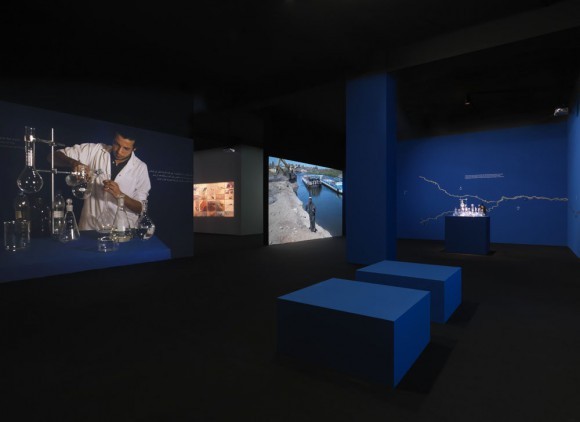Ursula Biemann
02 Mar - 28 Apr 2013
URSULA BIEMANN
Egyptian Chemistry – Deep Weather – Sahara Chronicle
Curated by Kathrin Becker
2 March – 28 April 2013
Ursula Biemann (b. 1955) is an artist, theorist, and curator. Since 2002 she has been researching at the Institute for Theory at Zurich University for the Arts. Biemann was awarded an honorary doctorate by the University of Umeå (2008) and the Prix Meret-Oppenheim (2009). Lately her works were exhibited at: Alexandria (2012); LENTOS Museum, Linz (2012); Center for Art and Media Karlsruhe (2011); Cooper Union, New York (2011) and 7th Shanghai Biennial (2008); 10th Istanbul Biennial (2007); Liverpool Biennial (2004), among others.
The exhibition Egyptian Chemistry – Deep Weather – Sahara Chronicle at Neuer Berliner Kunstverein presents a selection of Biemann’s large-scale projects in spatial staging, focusing on two current works that are shown for the first time on the European continent: the single channel projection Deep Weather (2013), which offers insights into the global causes and impacts of climate change, and Egyptian Chemistry (2012), an installation with a water laboratory and a five channel video that sheds light on the hybrid ecology of Egypt and the role of the Nile in this system. To complement the two new works, Sahara Chronicle (2006–2009) investigates clandestine migration routes within northern Africa, but also the points where labor migration and the overexploitation of resources like uranium and fisheries intersect.
Subtle and profound, Biemann’s work makes use of existing knowledge, reflecting upon correlations and subjective impressions and combining them with academic findings. Biemann’s artistic approach creates a new way of organizing knowledge and provides a platform for all actors upon which they can leave aside their classical roles as victim and enter into a differentiated dialogue on a par with the beholders. The non-linear narrative structure that characterizes Biemann’s works presents a narrative and visual mosaic of impressions that ultimately compose a complex image. For this reason, her impressive works are not documentaries in the representative sense, but rather coalesce subjective statements of eyewitnesses with academic questions and contrast knowledge from the public media with surprising images and contrary viewpoints from politics, history, culture, and sociology.
Egyptian Chemistry – Deep Weather – Sahara Chronicle
Curated by Kathrin Becker
2 March – 28 April 2013
Ursula Biemann (b. 1955) is an artist, theorist, and curator. Since 2002 she has been researching at the Institute for Theory at Zurich University for the Arts. Biemann was awarded an honorary doctorate by the University of Umeå (2008) and the Prix Meret-Oppenheim (2009). Lately her works were exhibited at: Alexandria (2012); LENTOS Museum, Linz (2012); Center for Art and Media Karlsruhe (2011); Cooper Union, New York (2011) and 7th Shanghai Biennial (2008); 10th Istanbul Biennial (2007); Liverpool Biennial (2004), among others.
The exhibition Egyptian Chemistry – Deep Weather – Sahara Chronicle at Neuer Berliner Kunstverein presents a selection of Biemann’s large-scale projects in spatial staging, focusing on two current works that are shown for the first time on the European continent: the single channel projection Deep Weather (2013), which offers insights into the global causes and impacts of climate change, and Egyptian Chemistry (2012), an installation with a water laboratory and a five channel video that sheds light on the hybrid ecology of Egypt and the role of the Nile in this system. To complement the two new works, Sahara Chronicle (2006–2009) investigates clandestine migration routes within northern Africa, but also the points where labor migration and the overexploitation of resources like uranium and fisheries intersect.
Subtle and profound, Biemann’s work makes use of existing knowledge, reflecting upon correlations and subjective impressions and combining them with academic findings. Biemann’s artistic approach creates a new way of organizing knowledge and provides a platform for all actors upon which they can leave aside their classical roles as victim and enter into a differentiated dialogue on a par with the beholders. The non-linear narrative structure that characterizes Biemann’s works presents a narrative and visual mosaic of impressions that ultimately compose a complex image. For this reason, her impressive works are not documentaries in the representative sense, but rather coalesce subjective statements of eyewitnesses with academic questions and contrast knowledge from the public media with surprising images and contrary viewpoints from politics, history, culture, and sociology.

